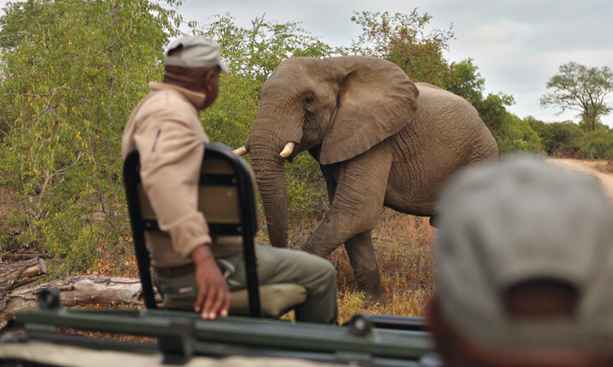A local Professional Guide, Oaitse Nawa has formed a non-governmental organisation, Elephant Protection Society which strives to prevent deadly encounters between humans and elephants to reduce human wildlife conflicts.
The organisation aims to create a pleasant environment between animals and humans to safeguard human life and conservations ideals. Nawa who hails from Boro village explains that the organization comes as the country and district continue to experience escalating human deaths caused by elephants, which they want to reverse. His organization plans to sensitize the community about elephant behavior, how people should behave when they come across wild animals and to promote co-existence.
A local Safari guide advises people that one of the most critical things when they are in the jungle, they must always be alert and attentive than to relax as this will help them to see an elephant early enough to escape. Elephant protection society conducts some educational walk in the jungle and go to elephant territory so that people can experiment first hand information on how they behave and how they conduct themselves when an elephant charges at them.
Nawa explains that the terrifying experience is very helpful but most of the people are not eager to participate in it. He explains that people must observe the types of winds such as the down and up wind as this might help them to avoid running into an elephant. He advises people that when an elephant charges at them they should not run but hide behind objects like big trees to avoid being detected. He said whenever people are walking in the jungle they should always plan an escape should an elephant attack them.
Nawa said there are three types of elephants; a lonely bull, breeding head and bachelors. He explains that a lonely bull when is in mating state or in a process of finding partners is the most dangerous and must be avoided at all costs. It can be identified by a strong smell. When people are in the forest, they must always use their senses of smell, hearing and sight. “If you smell something you must be alert and know that something is going on,” he says.
Nawa says most of the people negatively affected by increasing numbers of elephants are poor farmers who do not have the means to fend for themselves. “These are the people who need help for elephants to be chased back into the protection areas,” he said, adding that they are no longer free to visit their cattle posts freely as it used to happen in the past.
Nawa also decried that this week a 48 year old man from Moeti ward in Maun was killed by an elephant despite having people with expertise like Elephant protection Society who can prevent these deaths. “We want to raise awareness to the community about these organization in order to prevent these conflicts,” Nawa stress
One of the challenges has been shortage of transport and funds. Nawa said they have given communities in wildlife areas seeds for chili pepper to plant in their farms as it is a mitigation factor to prevent elephant damaging crops. He decried that the Department of Wildlife and National Parks cannot cope as the Anti-Poaching is incapacitated to even drive the elephants back from farming areas on a regular basis.
Nawa explained that recently he has been singularly driving elephants in Boro and in Botshabelo just behind the Maun airport. ‘Part of the problem we have is that DWNP is failing to drive away elephants from contact with humans.’
Nawa said his organization will soon be launched saying part of the launch activities will including a walk to raise funds to sink boreholes in protected to prevent elephants from going into human settlements in search for water.
